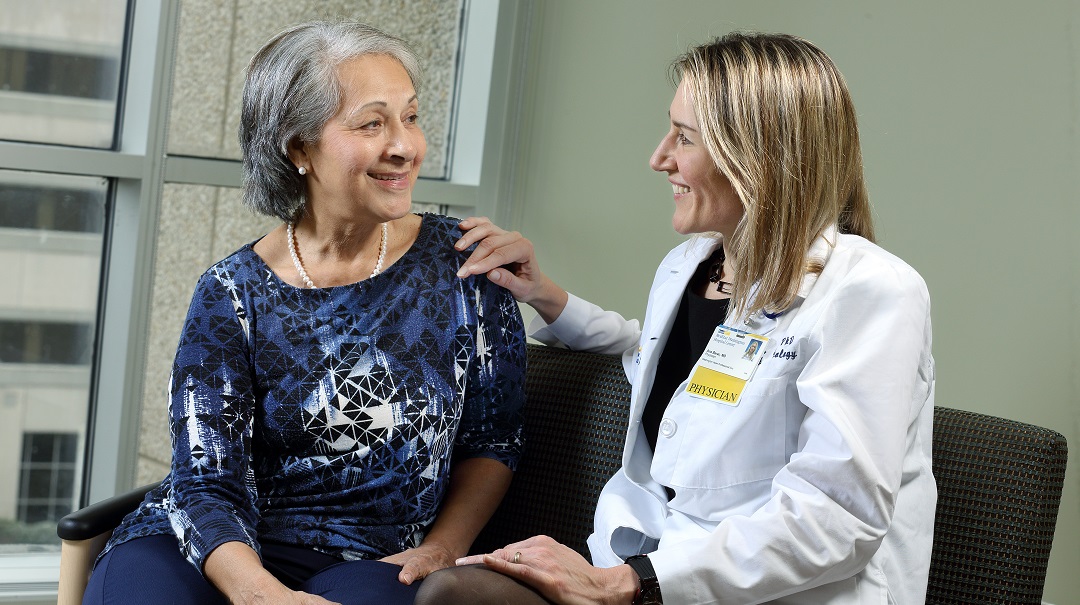Find care now
If you are experiencing a medical emergency, please call 911 or seek care at an emergency room.

Breast cancer treatment has come such a long way in recent years that life expectancy continues to improve, and we are often able to approach treatment like we would a chronic disease. But some women with an aggressive form of breast cancer known as “HER2-positive” can face another health risk – a weakened or damaged heart.
Current guidelines actually recommend not giving HER2-targeted medication to women with an abnormal heart function. And women whose heart function declines during treatment are sometimes taken off these lifesaving drugs altogether.
As a cardiologist who specializes in helping protect cancer patients’ hearts, this situation concerned me a great deal. We know how effective these cancer treatments can be. That is why I am so pleased with the results of a recent multi-center study called SAFE-HEaRt, published in the Breast Cancer Research and Treatment journal in March 2019. It is the first study of its kind to include women with heart dysfunction, and it showed that it is safe for them to continue HER2-targeted therapies. The caveat is that they should be receiving protective heart medication managed by a cardiologist at the same time.
What is HER2-Positive Breast Cancer?
Every year, more than 330,000 women in the United States will develop breast cancer, and about one in four will be HER2-positive. This type of breast cancer has a higher-than-normal level of a protein called HER2 (human epidermal growth factor receptor), which makes it a more aggressive form of the disease.
Fortunately, highly targeted therapies have significantly improved the outcomes for patients with this type of cancer. Unfortunately, these therapies can put added stress on the heart and result in heart failure. We see heart function decline in about 10 to 15 percent of women with HER2-positive breast cancer. While many patients never show any noticeable symptoms, about two to three percent do.
SAFE-HEaRt Trial: The Who, What, Where and Why
We developed the SAFE-HEaRt trial in association with Sandra Swain, MD, associate dean for Research Development at Georgetown University Medical Center, and Filipa Lynce, MD, medical oncologist at MedStar Georgetown University Hospital. The trial was a collaboration that included MedStar Heart & Vascular Institute as well as the cancer institutes at both MedStar Washington Hospital Center and MedStar Georgetown. The study’s purpose was to determine whether it was safe to continue giving HER2-targeted medications to patients with reduced heart function.
The study was investigator-initiated, meaning that we developed the protocol, and Genentech supported its execution. Genentech is the maker of the HER2-targeted therapies that were delivered to the patient.
This is the first prospective study of its kind. We approached patients who needed HER2-targeted therapy and also had an abnormal heart study to ask if they would be interested in participating. If they were interested and eligible, they received treatment as part of the study. We ultimately evaluated 30 patients.
Of these patients, some were treated for their cancer with trastuzumab (Herceptin), others with a combination of trastuzumab and pertuzumab (Perjeta) or TDM-1 (ado-trastuzumab emtansine). Cardiac treatment included beta blockers, ACE inhibitors, or ARBs (angiotensin II receptor blockers).
What Did We Learn? Cancer Therapy Can Continue Safely
- Our study indicates that it is safe to continue HER2-targeted therapies in patients who have mildly reduced heart function or whose hearts show some declines during treatment. Twenty-seven patients (90 percent) completed their planned HER2-targeted therapies without having a cardiac event or seeing a significant decline in their heart function.
- Patients must receive appropriate heart medications during treatment.
- This approach requires close collaboration between the oncologist and cardiologist.
This study is a valuable first step in helping us identify the best ways to protect the heart while making sure patients receive the most effective breast cancer treatments available. The next steps include gathering information about these and similar patients in the long term, and developing larger trials among patients in community hospitals, not just tertiary care centers like the ones in this study.














